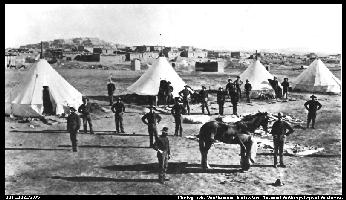
Dr. Ken Barger
Anthropology, IUPUI
August 16 2001
E320 North American Indians

A U.S. Army camp at Zuni Indian pueblo, New Mexico, early 1900s. When we encounter people of other cultures, ethnocentrism can lead us to misunderstand their ways. For example, AngloAmericans have at times criticized the Zuni belief in witches as "superstitious." But they have failed to see the important social functions of this belief. People who are disruptive to community life and well-being are usually the ones accused of being witches, and the threat of being branded as a witch encourages people to behave properly. The religious belief in witches thus has important social control functions. We usually react to others' ways based on different meanings of life experiences, without considering the functions these behaviors may have in other areas of culture. If we can recognize and control for our ethnocentrism, we can go on to more valid understandings of others.
The general goal of the course is to develop our abilities to understand the life experiences of Native Americans in a valid and balanced manner, particularly in the context of both the idealistic and the negative popular misconceptions about Indians. One of the most important concepts and learning skills we will address all semester long is recognizing and controlling for ethnocentrism. This will particularly be a major challenge to those people who think they are open-minded and admire American Indians, and these people will need to be committed to critically examining their own assumptions and beliefs about life. So the ultimate goal of the course is to develop our learning abilities to understand other peoples, and to keep what we do know in the extensive context of what we do not know.
In order to succeed in this course, both in terms of developing your learning abilities that will help you in your life and career goals and of earning higher grade, you must be able to achieve the following Learning Objectives:
Course Contents:
Learning Abilities (see the IUPUI Principles of Undergraduate Learning)
Personal and Social Abilities (see the IUPUI Principles of Undergraduate Learning)
Technical Skills
Students also need to be aware that this course expects you to be responsible for your own learning, and to commit a sufficient amount of your time and energy to learning in this course. The course requires critical thinking about the issues and in developing your learning abilities. This effort will be rewarding for those who commit themselves to the in-depth learning about American Indians. This course is designed to be a challenging learning experience, not necessarily to entertain or to be an easy grade in an interesting topic. Those who either cannot or do not want to devote the necessary effort should give serious consideration to dropping the course. For those able and willing to make an effort, I and some American Indians friends look forward to working together with you in the learning process.
We will begin by reviewing key ideas in Anthropology that can help us in understanding peoples of other cultural backgrounds: human adaptation, culture, ethnocentrism. After looking at the inhabitation of the New World by humans, the course will then focus on the wide cultural diversity among Native Americans. We will survey and compare Native American lifestyles in the ten major culture areas at the time of extensive European American contact, including languages, subsistence styles, social organization, world view, and religion. Historical relations with EuroAmerican societies and contemporary Native Americans as a part of U.S. society will also be reviewed for each culture area and in general. We will finish by reviewing the situations and issues of contemporary Native Americans.
You should also think about your own goals for the course. What do you want to learn and develop in this course (and in your other courses and in college)?
What Makes a Good Learner?
In my experience in college teaching, effective learning has less to do with intelligence than with motivation, work habits, and, most of all, assuming responsiblity for your own development.
Check the web page on What Makes a Good Learner? for information on Learning Styles, Levels of Learning, Temperment for Learning, and Study Habits that contribute to academic success. In college, you are expected to be responsible for your own learning, and are held accountable for what you do or do not do on your own in courses.
The value of a college education is not knowledge in itself, but rather developing your abilities in general to learn a wide variety of things. In Anthropology, Math, History, Biology, and other subjects, you are asked to broaden your abilities to understand ideas, to evaluate information, and to apply your understandings. Being an effective learner is what contributes to being successful in your careers and to being a contributing member of society.
Hopefully, we will be able to work together to accomplish both course and individual goals, and at the end of the semester leave with a sense of success about what we have invested in this course that we will take with us beyond the semester. Ultimately, it is knowing how to learn that will be the real measure of success for the course as we continue through our lives, for then we can learn whatever we want and need to know. In this sense, I hope we will be able to work together to accomplish both the course and individual goals, and at the end of the semester leave with a sense of success about what we have invested in this course.
© WK Barger, 2001